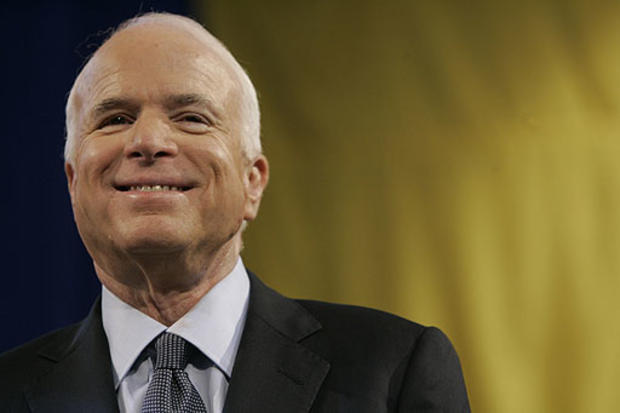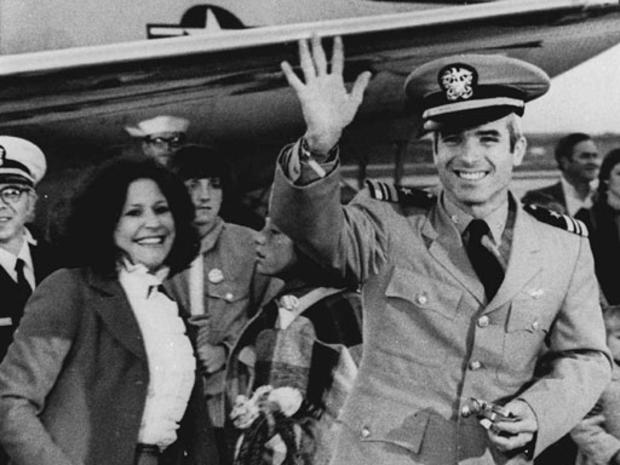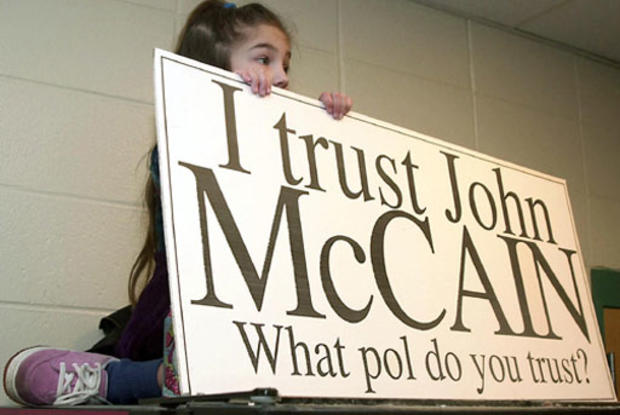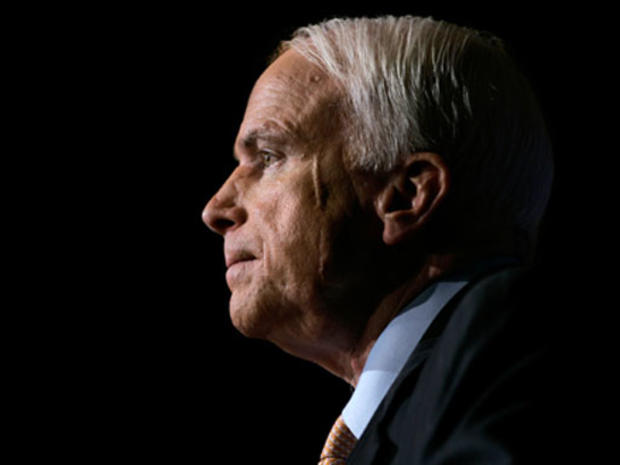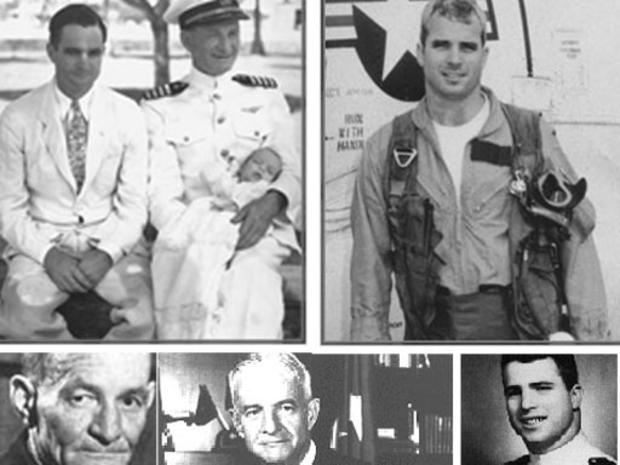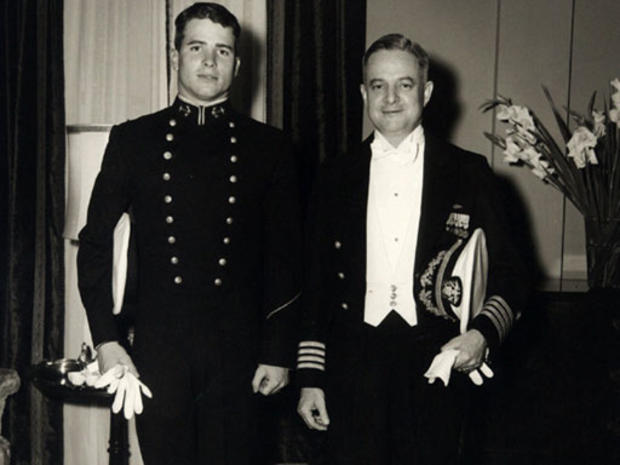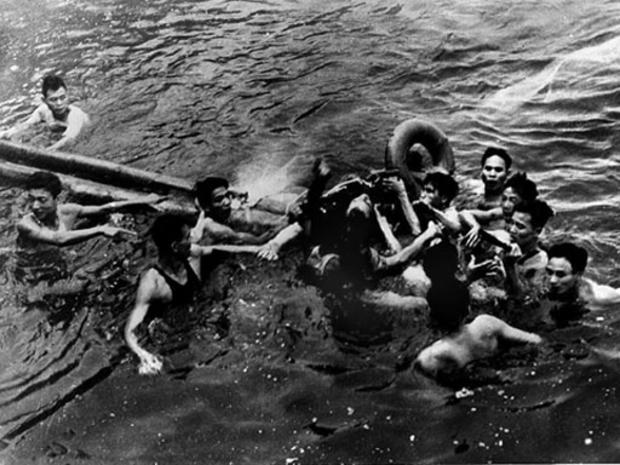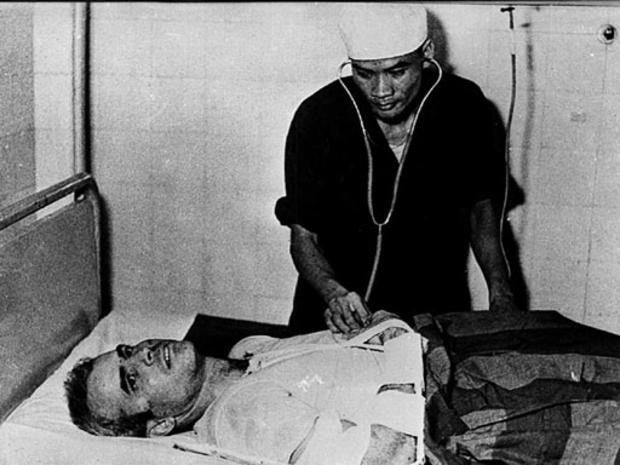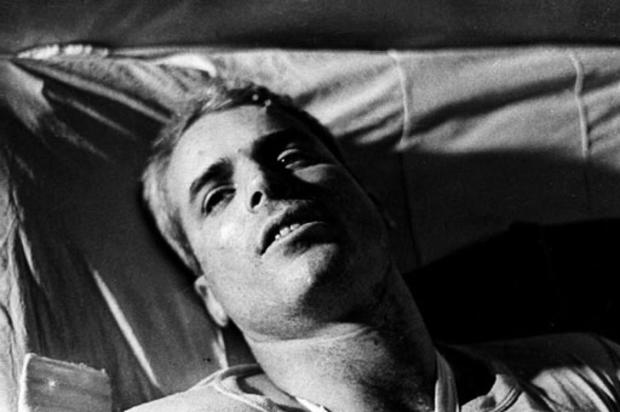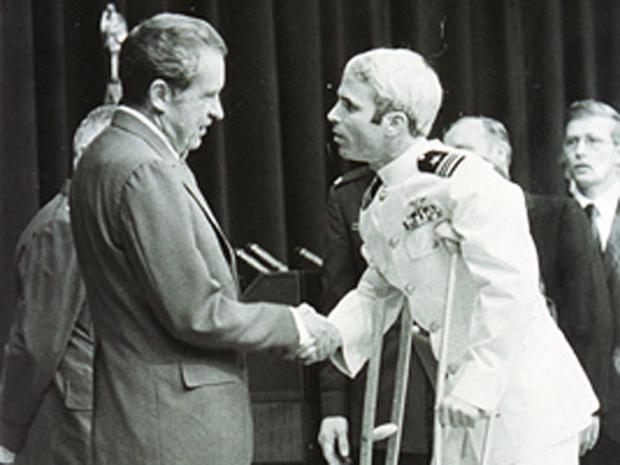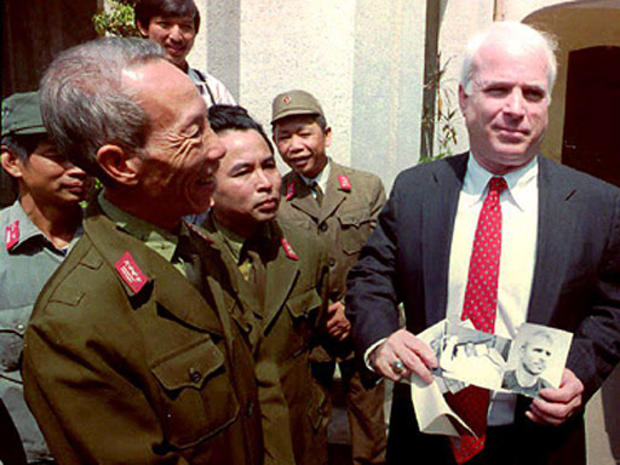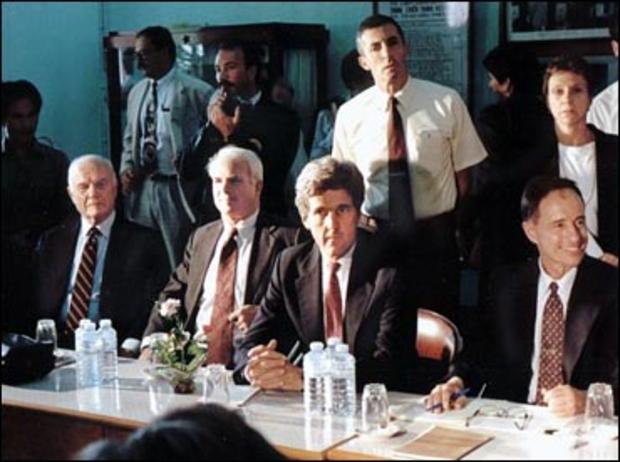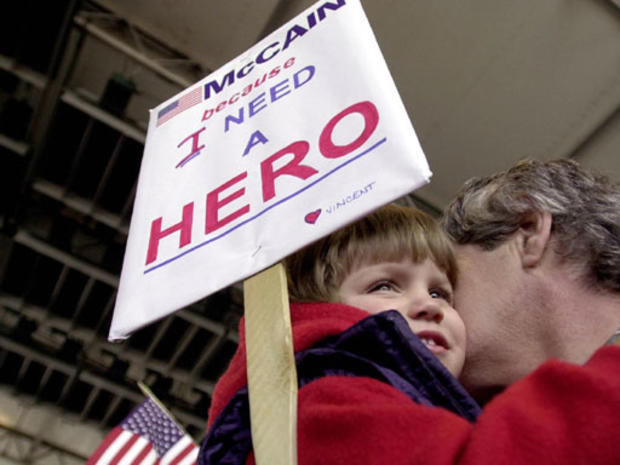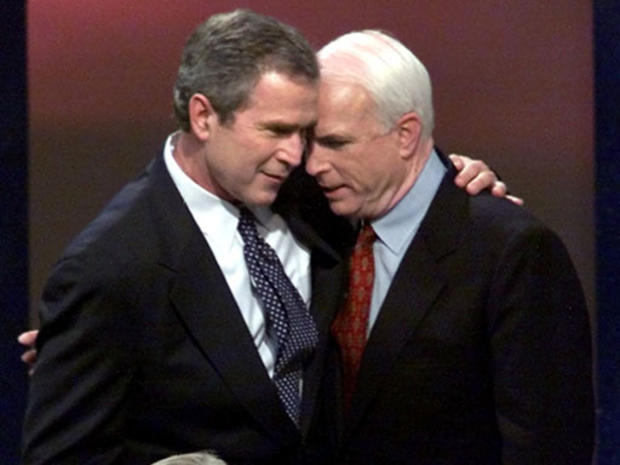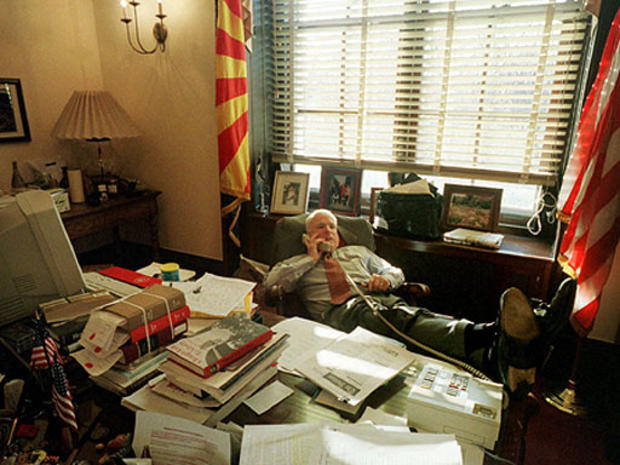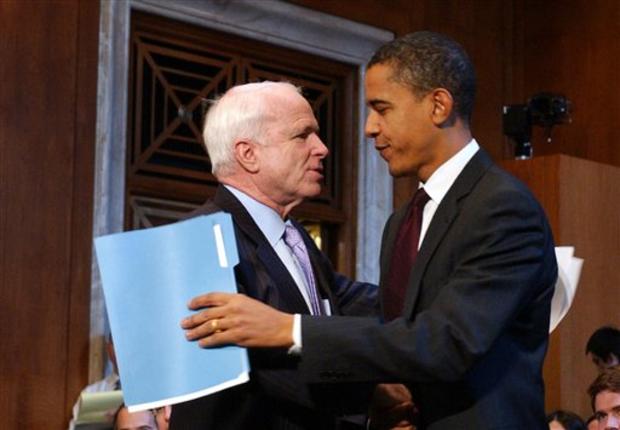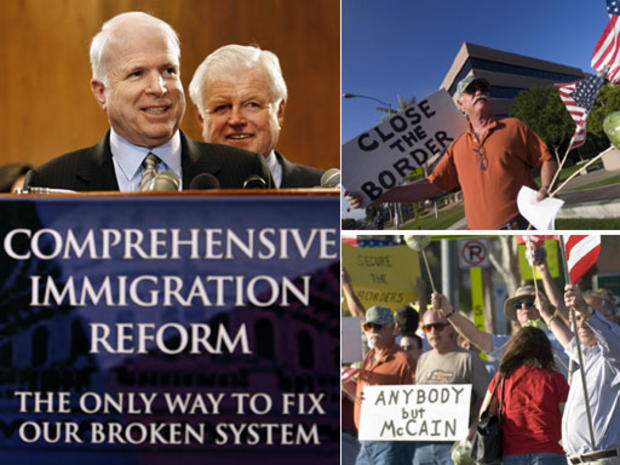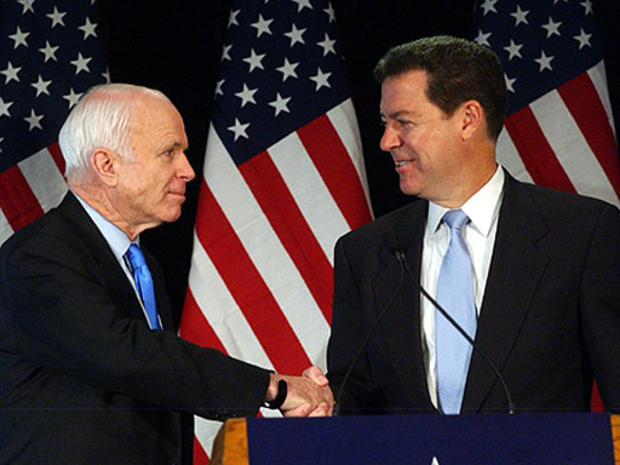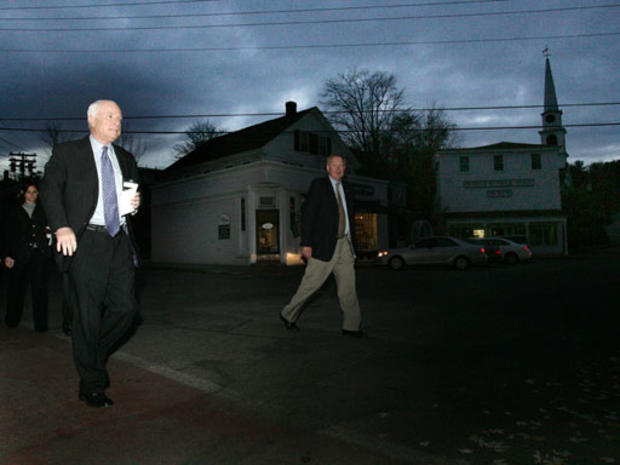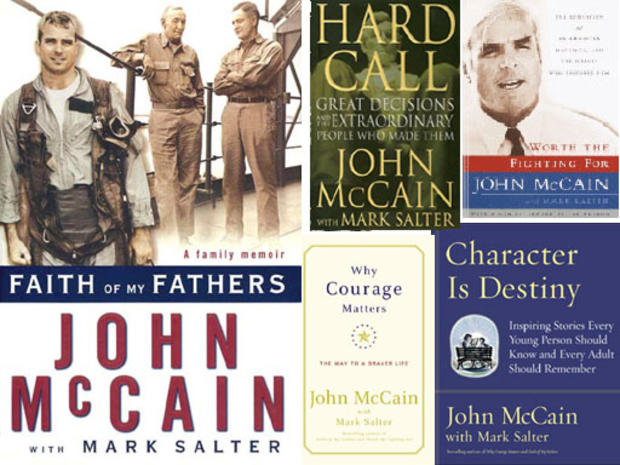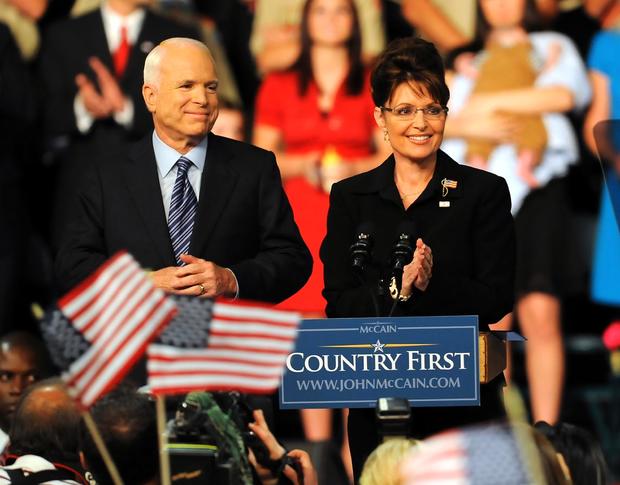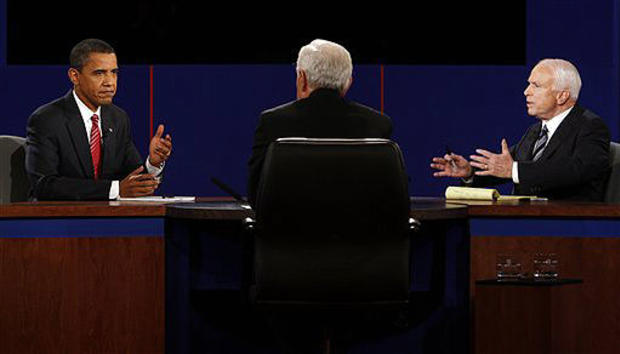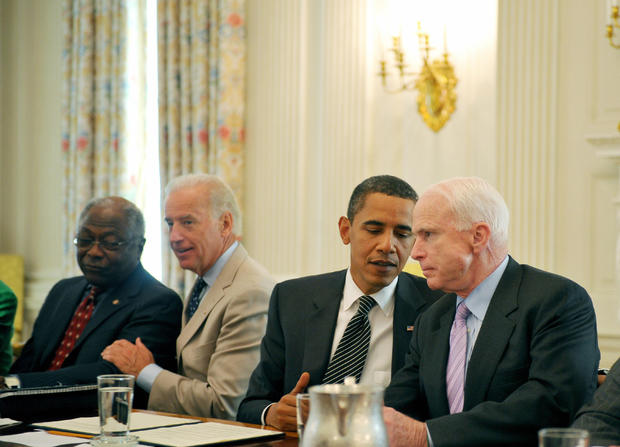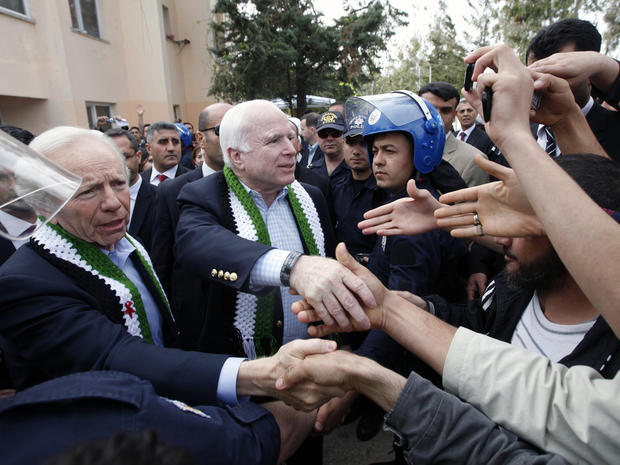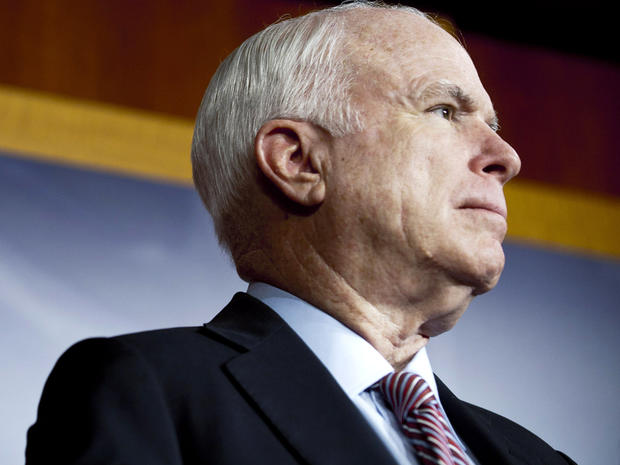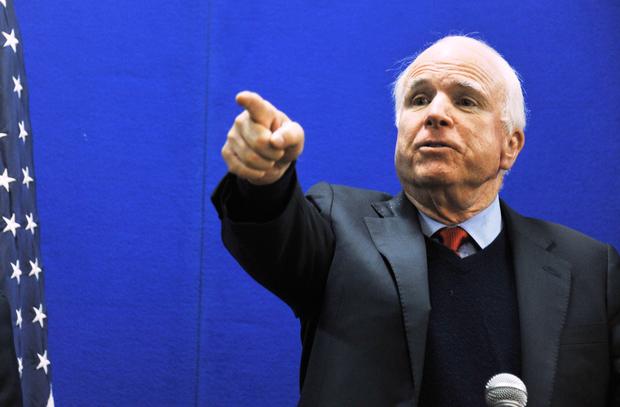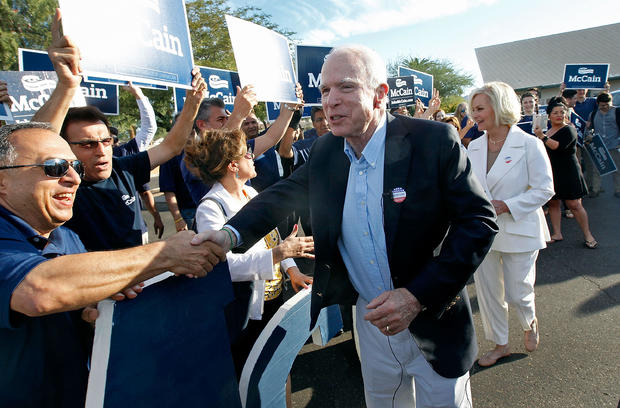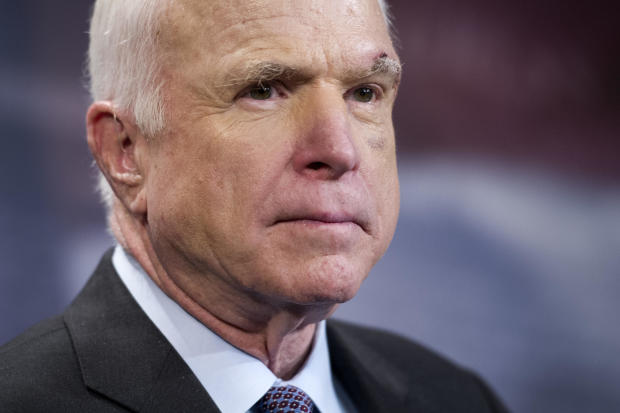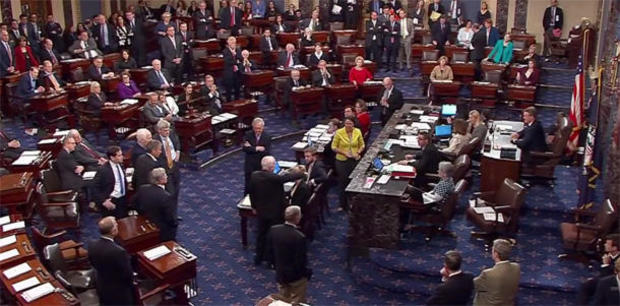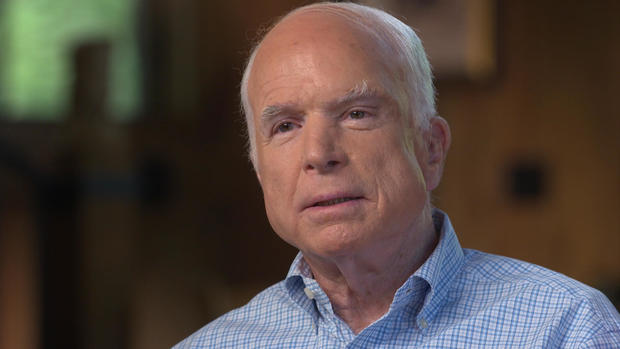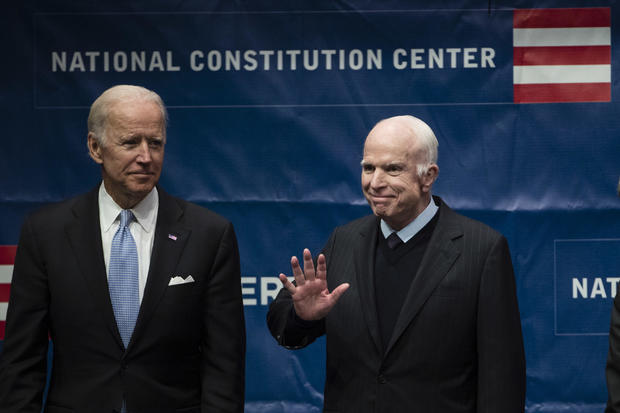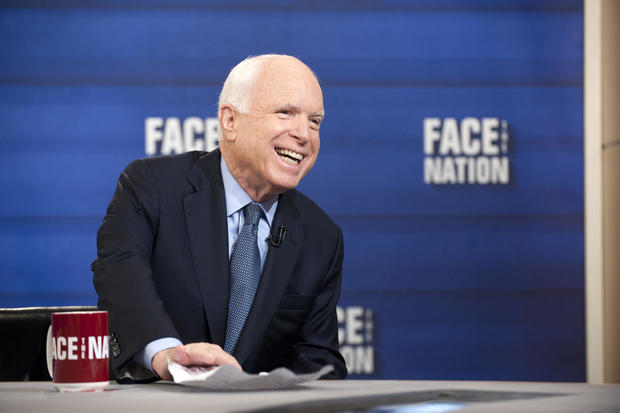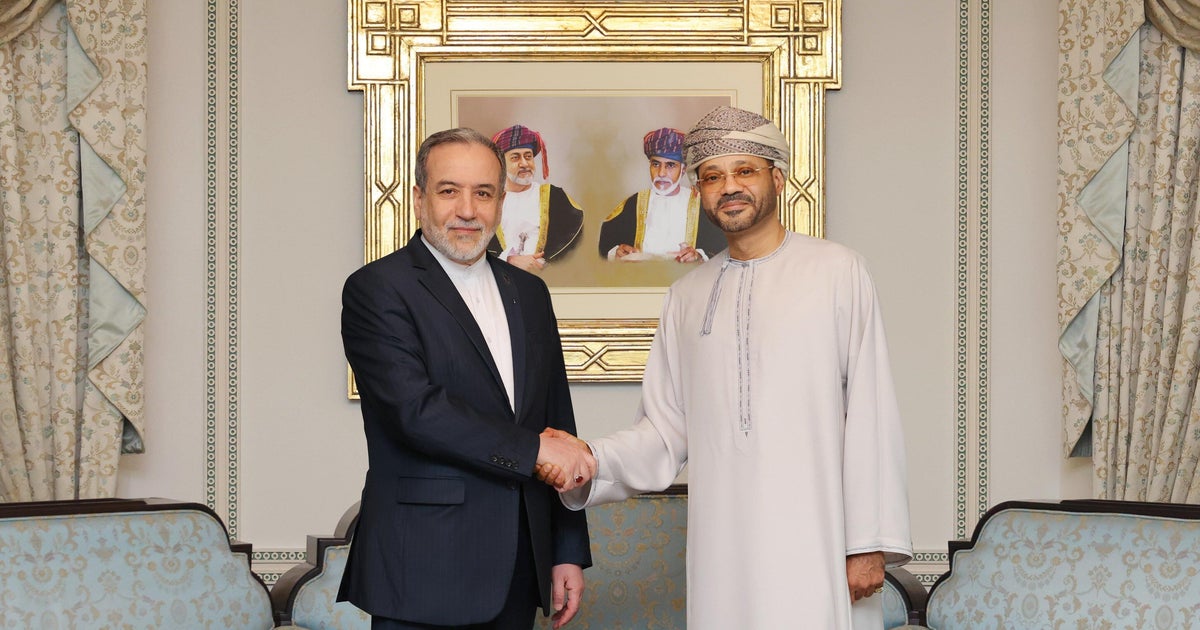John McCain 1936-2018
Sen. John McCain, R-Ariz., smiles at a town hall meeting in Las Cruces, N.M, during his 2008 presidential campaign. The military hero, who had a long career as a "maverick" Republican Senator, died on Saturday, August 25, 2018. He was 81.
To Some, A Hero
U.S. Navy Lt. Commander John S. McCain III returned to the United States in 1973, after having spent more than five years as a prisoner of war in Hanoi. His fellow prisoners called him a hero, for his refusal to accept release ahead of POWs who had been there longer. More than four decades later, even his political rivals called him a hero. It was a word McCain used often, but never about himself.
To Some, A Maverick
Michelle Hartman, 6, held up a sign in New Hampshire in 2000. McCain's reputation as a maverick was built upon his willingness to take positions unpopular with the public (his support for the Iraq war), with fellow Republicans (his support of a citizenship path for undocumented immigrants), or with other politicians as a whole (his push for campaign finance reform).
Presidential Candidate
In 2008 John McCain ran for a second time to be the President of the United States. "I'm not the youngest candidate," said McCain, then 71, in a speech. "But I am the most experienced. I know how the military works ... I know how Congress works ... I know how the world works."
Naval Tradition
John Sidney McCain III was born Aug. 29, 1936, in the Panama Canal Zone. His father and his grandfather were both U.S. Navy admirals. (Bottom, from left: Sr., Jr. and III.)
"My grandfather was a naval aviator, my father a submariner," McCain wrote in "Faith of My Fathers," his 1999 memoir. "They were my first heroes, and earning their respect has been the most lasting ambition of my life."
John McCain
McCain, left, stands in military dress uniform next to his father, John S. McCain Jr. "I always wanted to be in the Navy," McCain told the New York Times in 1967. "I was born into it and I never really considered another profession. But I always had trouble with the regimentation." He graduated from the U.S. Naval Academy in 1958, and became an aviator.
Shot Down
On his 23rd bombing mission over North Vietnam, his plane was shot down. This Oct. 26, 1967, photograph shows Hanoi residents recovering him from the city's Truc Bach lake. McCain said that upon capture he was struck, kicked, and bayoneted by several hundred Vietnamese before they were chased off by a nurse.
POW
A photo taken in 1967 shows McCain, then a major, being examined by a Vietnamese doctor. McCain said he was initially denied treatment by his captors, and beaten while interrogated, because they expected him to die of his wounds. This changed when they learned that his father was an important figure in the military (who would eventually be made the Commander-in-Chief of the Pacific command).
Torture
McCain, seen here in a Hanoi hospital, was frequently mistreated during his five years of imprisonment - beaten, malnourished, put into solitary confinement for two years, at one point tortured into signing a statement that began "I am a black criminal."
As a Senator he consistently spoke out against attempts to allow the U.S. to use torture, such as waterboarding: "We are a better nation than that."
Released
Upon his release, McCain was welcomed by then-President Richard Nixon on May 24, 1973. A quarter of a century later, McCain wrote: "I am a public figure now, and my public profile is inextricably linked to my POW experiences ... Obviously, such recognition has benefited my political career ... But I have tried hard to ... not let the memories of war encumber the rest of my life's progress."
Returned, As A Senator
McCain divorced and remarried, moved to Arizona, and was elected Congressman in 1981 and Senator in 1986. In 1992, he returned to Hanoi as a member of the Senate Select Committee on MIAs (missing in action). Here, Vietnamese officials (including Col. Pham Duc Dai, director of the Army Museum) give McCain 25-year-old photographs of himself as a prisoner.
Diplomatic Relations
McCain joined two Senate colleagues, John Glenn and John Kerry, in Vietnam in 1995. McCain was at first greatly hostile to Kerry, who had led anti-war protests following his Vietnam service, and made a point of campaigning against him when Kerry ran in Massachusetts. But in the Senate, they worked together on many Vietnam-related issues, including the resolution of those Missing In Action, and establishing full diplomatic relations with Vietnam.
Campaign 2000
Gene Goodrich and his two-year-old grandson, Vincent, attend a rally for McCain in Buffalo, N.Y., in March 2000. McCain's compelling war story, as well as his reputation for straight talking (he traveled in a campaign bus he named the "Straight Talk Express"), attracted excitement in his campaign among some Democrats and Independents as well as Republicans.
Bush Endorsements
While McCain beat his closest rival, George W. Bush, by about 20 points in the New Hampshire Republican primary, and won in a half-dozen other states, he wound up losing the nomination to the Texas Governor. McCain endorsed Bush in the 2000 general election. But he remained popular outside the party; indeed, John Kerry reportedly asked McCain to be his running mate in 2004. McCain endorsed President Bush again instead.
Campaign Finance Reform
McCain worked for seven years to reform campaign finance laws, eliminating unregulated "soft money" contributions. Here he is in his Capitol Hill office in Washington during the Senate debate of the McCain-Feingold campaign finance reform bill on Friday, March 23, 2001, which was passed into law. McCain tackled the system of campaign financing with like-minded Democrats, an issue which split him from Republican leaders.
Global Warming
Environmentalists long ago saw McCain as Washington's most important champion of legislation to curb global warming. Here he holds another hearing into addressing climate change, greeting fellow Sen. Barack Obama in January 2007.
Immigration
McCain worked on compromise legislation on immigration supported by President Bush, including a provision to allow undocumented immigrants to work their way towards citizenship, which could take up to 13 years. His support prompted protests outside his state office in Phoenix in April 2006 - and is said to have jeopardized his presidential prospects.
Social Issues
While once calling leaders of the Christian right "agents of intolerance," McCain has pointed out his consistently conservative record in the Senate on social issues. When Sam Brownback, a Kansas conservative and favorite of evangelical Christians, dropped out of the race, he endorsed McCain, calling him "the best pro-life candidate to beat Hillary Clinton."
Campaigner
McCain's stands on some issues were unpopular among many Republican voters, but supporters said McCain was an effective and tireless campaigner. Here he is walking across Main Street in Meredith, N.H., on his way to another 2008 campaign stop.
Author
McCain wrote six best-selling books - "Faith of My Fathers" (1999), "Worth the Fighting For" (2002), "Why Courage Matters" (2004), "Character Is Destiny" (2005), "Hard Call" (2007), and most recently "13 Soldiers: A Personal History of Americans at War" (2014) - all co-authored with his chief of staff, Mark Salter.
"McCain's two most dominant traits are his restlessness and his fortitude," Salter told the Chicago Tribune.
Running Mate
John McCain stands with Alaska Gov. Sarah Palin on Aug. 29, 2008, in Dayton, Ohio. McCain, who picked Palin as his vice presidential running mate, said, "She's got the grit, integrity, common sense and fierce devotion to the common good that is exactly what we need in Washington today."
Debate
Democratic presidential candidate Sen. Barack Obama, D-Ill., and Republican presidential candidate Sen. John McCain, R-Ariz., exchange responses as debate moderator Bob Schieffer listens during a presidential debate at Hofstra University in Hempstead, N.Y., Wednesday, Oct. 15, 2008.
President and Senator
President Barack Obama talks to Senator John McCain, as House Majority Whip James E. Clyburn (left) and Vice President Joe Biden (2nd left) look on, during a meeting with members of Congress from both parties to discuss immigration, June 25, 2009, in the State Dining Room of the White House in Washington, D.C.
Turkey
Sen. Joe Lieberman (I-Conn.), left, and Sen. John McCain (R-Ariz.) are seen with Syrian refugees at a camp in Yayladagi, Turkey, Tuesday, April 10, 2012. McCain and Lieberman toured a refugee camp in the southern province of Hatay, at the Turkish border with Syria, and met with Syrians who had fled the violence in their country. Speaking to reporters, McCain had strong words for Damascus' allies, Russia and China.
Firebrand
In 2012 Sen. McCain, who had long fought for campaign finance reform, blasted the Supreme Court's decision on Citizens United, which allowed unlimited amounts of "dark money" from anonymous donors to fund political campaigns. He called the court's opinion "one of the worst decisions in history.
"I predict to you that, in the future, there will be scandals," he told CBS' "The Early Show," "because there is too much money washing around political campaigns now that nobody knows where it came from and nobody knows where it's going."
Maverick
In January 2014, in a sign of the rise of extremism against established party officeholders, Arizona Republicans censured Senator John McCain - their party's 2008 presidential nominee - for a record they called too "liberal."
The resolution by party members condemned McCain's role in helping to craft a Senate bill that would provide a pathway to citizenship for up to 11 million illegal immigrants, which the state Republicans called "amnesty." Also criticized was McCain's support for funding the Affordable Care Act, and positions he had taken on gun rights.
At the same meeting, the state Republican committee members also voted their support for abolishing the Constitutional amendment that enshrined direct election of senators by the public.
Election
Sen. John McCain (R-Ariz.) and his wife Cindy greet supporters after casting their votes at the Mountain View Christian Church polling place on November 8, 2016 in Phoenix, Arizona. McCain won his sixth term in the Senate, after defeating a primary challenger, State Senator Kelli Ward, and his Democratic rival, Rep. Ann Kirkpatrick.
McCain announced he would write in an alternative to Republican presidential candidate Donald Trump, who had smeared McCain's war record on the campaign trail. ["He's not a war hero," Mr. Trump said in July 2015. "He was a war hero because he was captured - I like people who weren't captured."]
Cancer
In July 2017, Sen. John McCain was diagnosed with brain cancer, and underwent a procedure to remove a blood clot from above his left eye.
The Mayo Clinic Hospital in Phoenix released a statement saying, "Subsequent tissue pathology revealed that a primary brain tumor known as a glioblastoma was associated with the blood clot."
McCain had previously been treated treated for melanoma (a form of skin cancer) in 2000, and again in 2002.
Obamacare Repeal
On July 27, 2017, turning his thumb down, Senator John McCain joined Republican Senators Murkowski of Alaska and Susan Collins of Maine, and all Democrats, in voting against a Senate Bill to repeal parts of the Affordable Care Act.
The Fighter
In September 2017, Sen. McCain told Lesley Stahl of CBS' "60 Minutes" that he was undergoing both radiation and chemotherapy treatments for his cancer, before heading off to a full day of work on Capitol Hill, including chairing hearings of the Armed Services Committee.
"I am more energetic and more engaged as a result of this, because I know that I've got to do everything I can to serve this country while I can," he said.
Liberty Medal
Sen. John McCain, R-Ariz., accompanied by Chair of the National Constitution Center's Board of Trustees, former Vice President Joe Biden, waves as he takes the stage before receiving the Liberty Medal in Philadelphia, Monday, Oct. 16, 2017. The honor is given annually to an individual who displays courage and conviction while striving to secure liberty for people worldwide.
In addition to recalling his more than two decades of Navy service and his imprisonment in a Vietnam prisoner of war camp, McCain took a moment to described the current fractured political climate.
"To abandon the ideals we have advanced around the globe, to refuse the obligations of international leadership for the sake of some half-baked, spurious nationalism cooked up by people who would rather find scapegoats than solve problems," he said, "is as unpatriotic as an attachment to any other tired dogma of the past that Americans consigned to the ash heap of history."
He continued: "We live in a land made of ideals, not blood and soil."
John McCain
Sen. John McCain (R-Ariz.) is pictured on the set of CBS' "Face the Nation" in Washington, D.C., September 17, 2017.
McCain died on Saturday, August 25, 2018, surrounded by his wife Cindy and their family. In a statement his office noted that he had "served the United States of America faithfully for sixty years."
By CBSNews.com senior producer David Morgan
